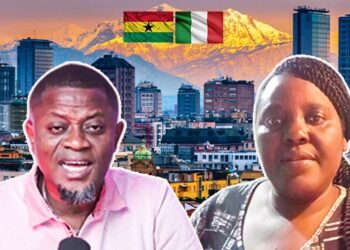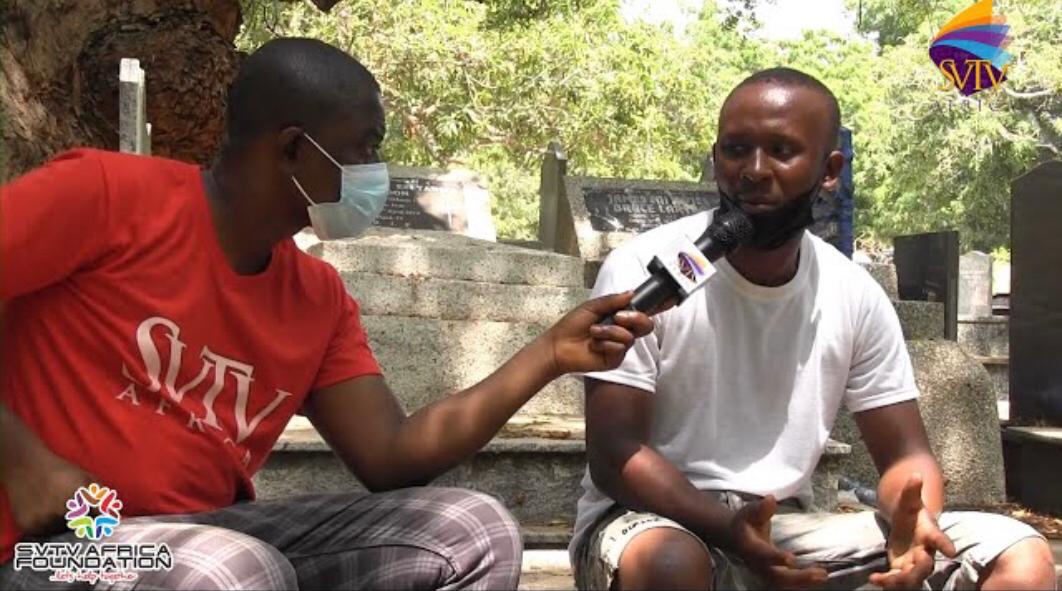Kwasi recently appeared as a guest on SVTV Africa’s Daily Hustle Worldwide with DJ Nyaami, where he shared his journey to Russia and the challenges he faced along the way.
Currently living in Moscow, Kwasi has been in Russia for just two months. He initially obtained his visa from the Ghanaian embassy, transiting through Dubai before arriving in Russia. Originally from Adenta, East Legon, his trip to Russia wasn’t part of his initial plans. However, after seeing advertisements for Last Chance Travel and Tour on Angel TV and Onua TV, he decided to reach out to them.
Initially, the agency promised to secure a visa for Malta, but after paying them GH₵25,000 as part of a GH₵45,000 fee, his visa application was denied. Instead of refunding his money, the agent suggested applying for a Belarus visa. Kwasi was told that his visa on arrival was ready, so he sent an additional GH₵32,000 for a flight ticket. However, he later discovered that the Belarus visa was fake and was not in the official system. When he confronted the agency, they reassured him and claimed they would get him another visa.
As the process dragged on, many other clients also realized they had been scammed and started showing up at the agency’s office. Kwasi requested a refund, but the agent kept avoiding him. Eventually, he heard on TikTok that the owner of Last Chance Travel and Tour had been arrested in Kumasi. He rushed there, only to find over 60 other victims of the same scam. When he arrived, the suspect had already been released, but he was advised to file a complaint.
Despite all this, Kwasi was desperate to travel because his wife had recently given birth via C-section, their rent was due, and he was struggling financially. Eventually, through the same agent, he managed to get a Russian visa. However, he had to sell his car and land in Santos, leaving him with nothing. He even contemplated suicide due to the immense financial and emotional burden.
The agency charged him GH₵35,000 for the Russian visa, and since he had already secured it, he asked them to at least help him buy a flight ticket. Upon arrival in Russia, he was hosted by someone he had met at the embassy. Through this connection, he was introduced to another agent named Ernest.
Kwasi arrived in Russia on a tourist visa, but securing a work permit proved extremely difficult. No company was willing to offer him an official job without the proper documentation. The only jobs available to undocumented migrants paid poorly—working 12-hour shifts for just 3000rubles (around GH₵500). He also heard about Ghanaians and other Africans who had been lured into joining the Russian army with promises of high salaries. Initially, the military was offering 8 billion rubles as a signing bonus, but this was later reduced to 1.7 billion rubles, with a monthly salary of GH₵50,000.
A Ghanaian friend in the UK introduced him to someone in the Russian military, who told him that the war was nearing its end and encouraged him to join. However, after speaking with a soldier who had completed just two weeks of training and suffered severe burns, Kwasi reconsidered. The soldier had lost his fingers, and the reality of war became clear to him. He also received disturbing images showing thousands of dead soldiers, including Ghanaians, Cameroonians, and other African recruits. This made him realize that the war was far from over, and joining the military was a dangerous path.
Kwasi admitted that he had spent over GH₵100,000 on this journey, paying in installments over time. Now, he regrets the decision, as he has no clear path forward. He expressed frustration over how long it takes to save money but how quickly it can be lost. He noted that in Ghana, people often spend their savings on land instead of investing in profitable ventures. Despite his struggles, Kwasi remains hardworking and willing to do any job to survive.
Working conditions in Russia are tough, especially for immigrants. He mentioned that Ghanaians working night shifts in warehouses are often exploited, with about 50 people packed into grueling labor environments. However, he believes that no amount of advice can stop someone who is determined to travel. Many people ignore warnings, only to realize too late that life abroad is not as easy as they imagined.
Kwasi concluded by encouraging people to conduct thorough research before making travel decisions. He emphasized that many visa applications can be processed independently without relying on dubious travel agents. For those determined to travel to Russia, he advised having enough funds to eventually move to another country if necessary.
Watch The Video Below:
















